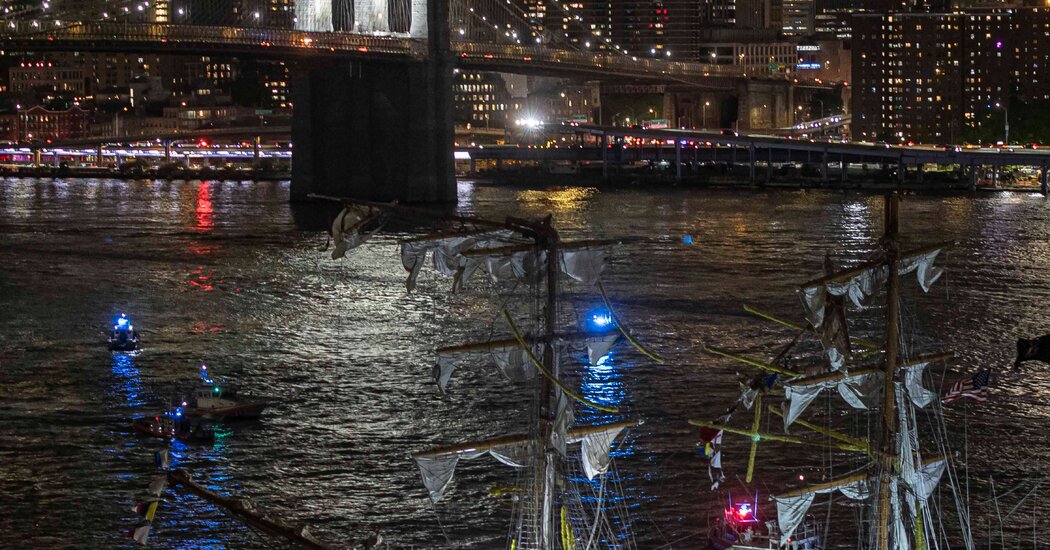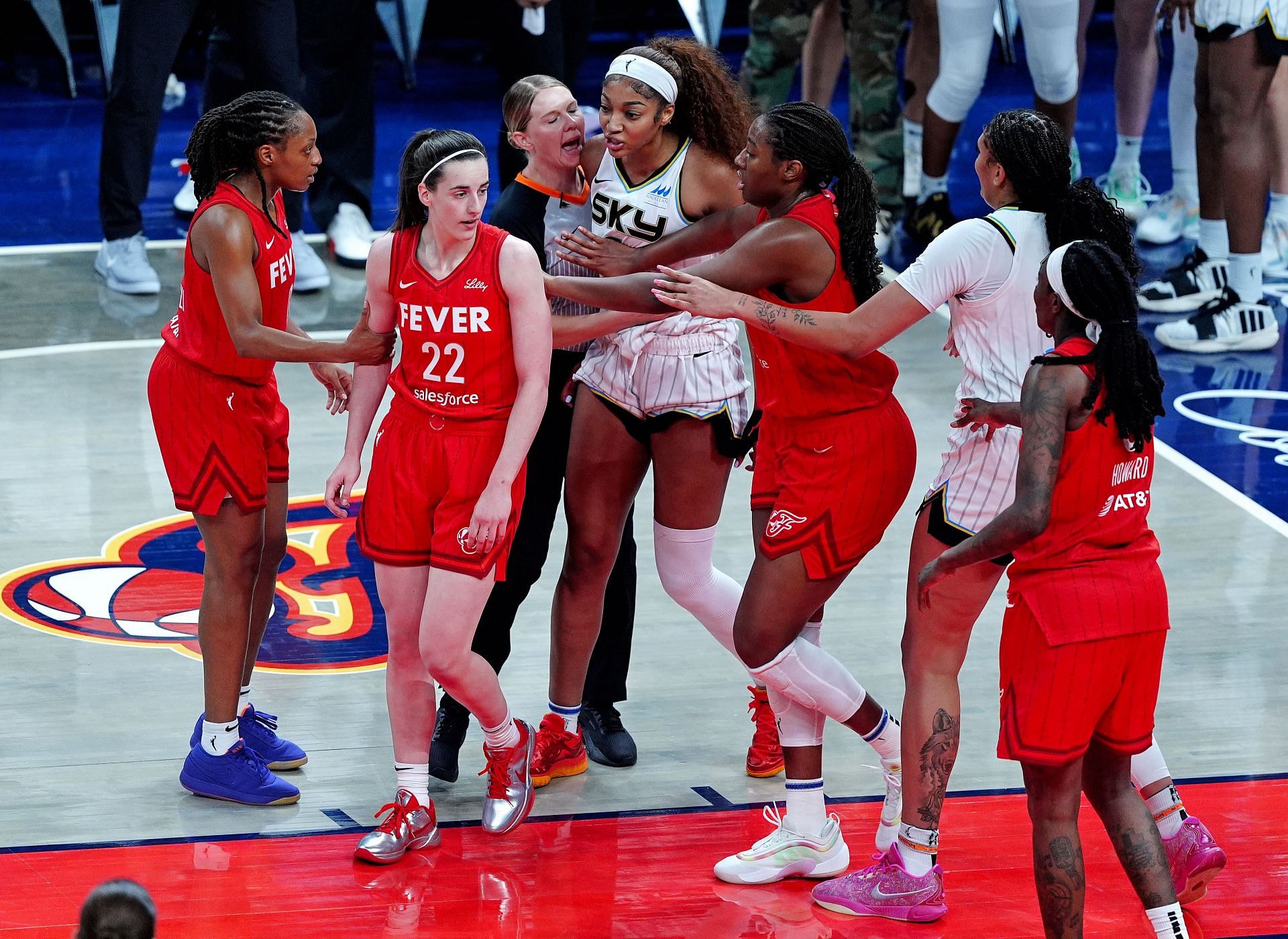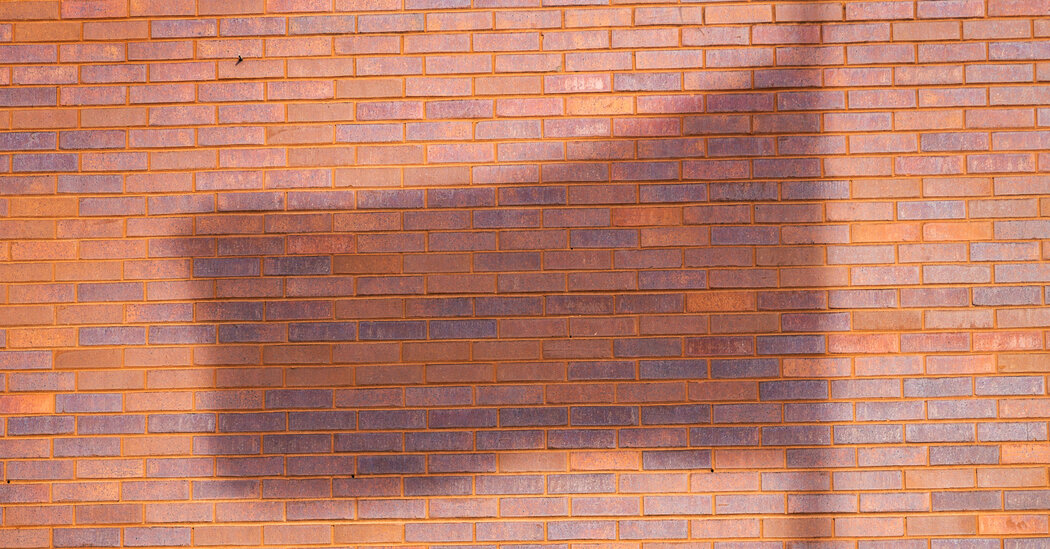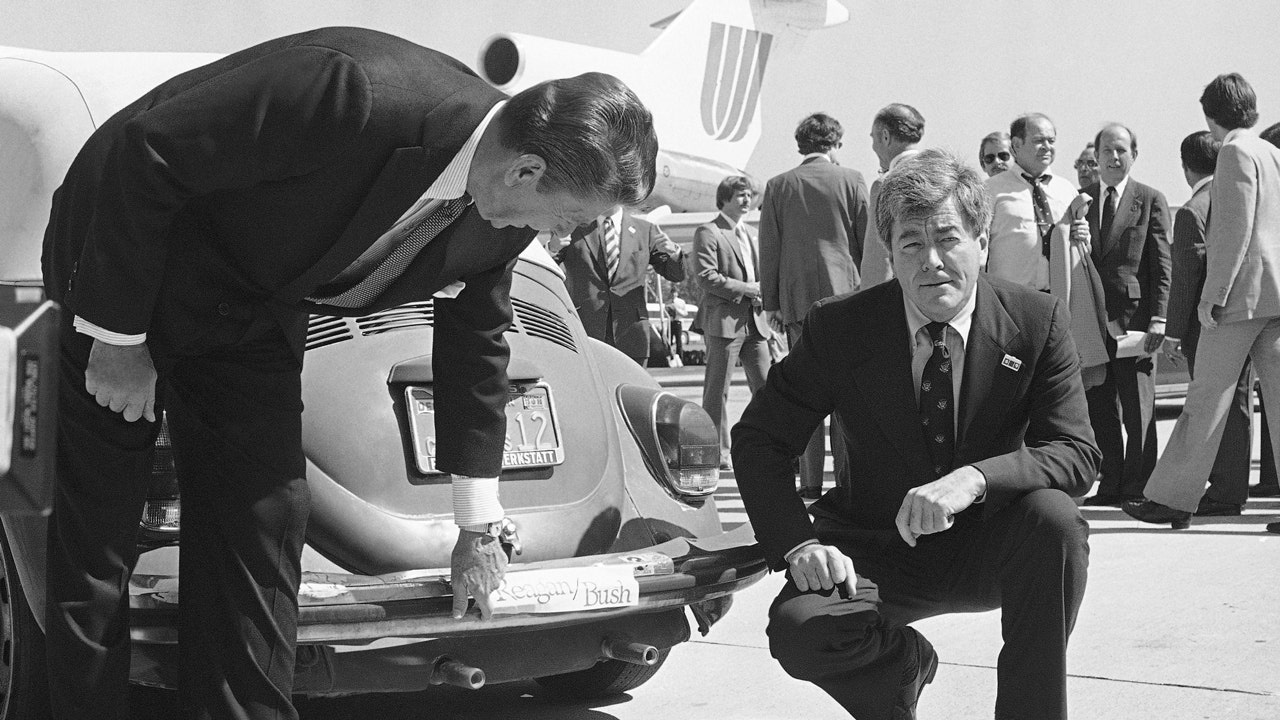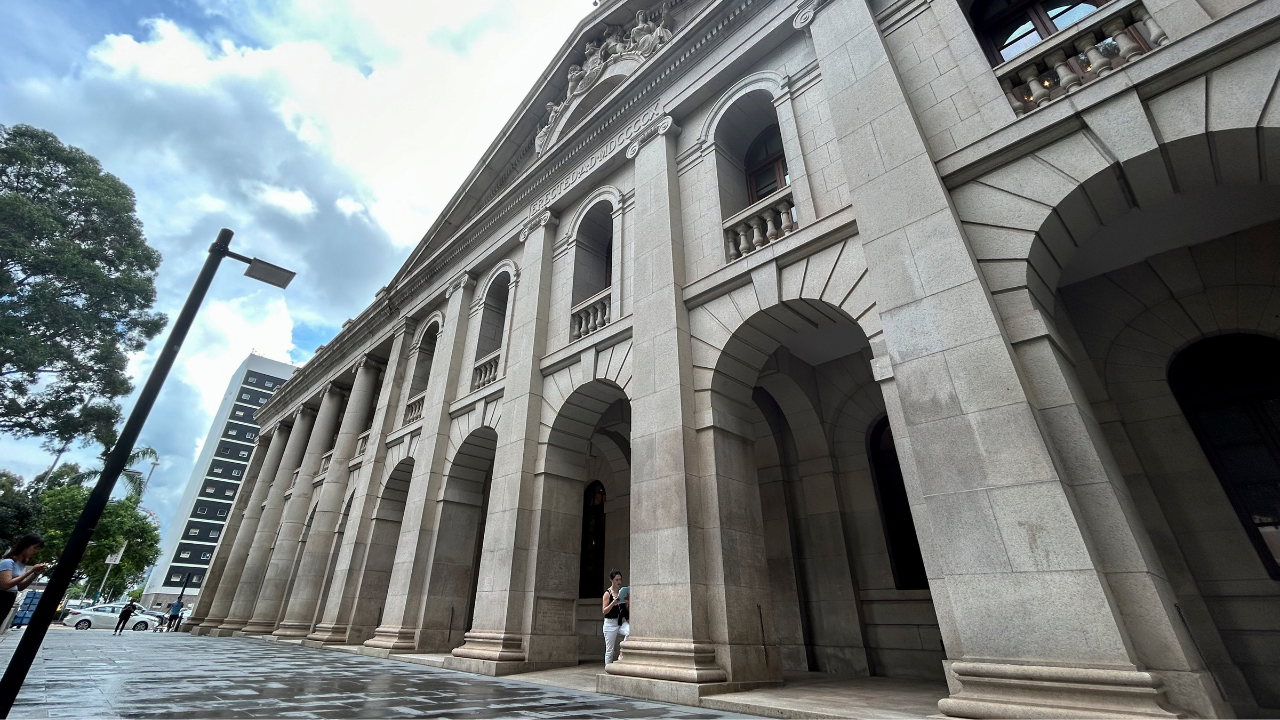A day after a Mexican sailing vessel slammed its masts into the underside of the Brooklyn Bridge, new details about the deadly crash began to emerge.
But as the hobbled, 300-foot long ship, the Cuauhtémoc, remained docked at Pier 36 in Manhattan on Sunday, a clear understanding of what went awry in the accident that killed two crew members remained elusive.
“To put it mildly, after being fully briefed on last night’s Brooklyn Bridge accident, one thing is very clear: There are many more questions than answers as to how the accident occurred and whether it could have been prevented,” Senator Chuck Schumer said during a news conference on Sunday.
As the National Transportation Safety Board and Mexican officials began a full investigation into the crash, those questions included what the “mechanical issues” were that authorities said caused the Cuauhtémoc to veer wildly off its course and into the bridge, and what role a tugboat seen in videos and photographs of the incident on Saturday night played in the accident.
The two victims of the crash were identified on Sunday by Mexican officials. América Yamileth Sánchez Hernández, 20, from the state of Veracruz, was named in a social media post by the state’s governor, Rocío Nahle, who sent condolences to her family.
“Veracruz is with you,” Ms. Nahle wrote.
The second victim was Adal Jair Maldonado Marcos, 23, according to Raúl Rangel González, the mayor of San Mateo del Mar, a coastal town in Oaxaca state where Mr. Maldonado Marcos was from.
At least 22 others were injured in the crash, including 11 who were in critical condition and nine who were in stable condition, the Mexican Navy said in a statement.
The accident occurred after the ship left Pier 17 in Manhattan, just below the Brooklyn Bridge. It was supposed to head south and sail out of New York Harbor, with a stop on the Brooklyn waterfront to refuel before heading to Iceland.
Instead, at about 8:30 p.m., the Cuauhtémoc headed in the wrong direction, under the Brooklyn Bridge, where it was never intended to sail, according to a spokesman for the city’s emergency management office.
McAllister Towing, a maritime towing, docking and transport company based in New York, said on Sunday that one of its vessels “assisted the Cuauhtémoc as it departed Pier 17.”
After the ship made contact with the bridge, “our crew provided additional assistance and promptly notified the appropriate authorities,” the company said in a statement.
“While the cause of the incident is still under investigation, McAllister Towing is fully cooperating with the relevant authorities and will continue to support the review process as needed,” the statement continued.
But Mr. Schumer characterized the tugboat’s role differently, saying, “The vessel did not use a tugboat’s assistance. The vessel pictured widely in posted videos was responding after the fact, not assisting before. Usually, very often, there is a tugboat before to help them get out, especially on a sailing ship.”
In the aftermath of the crash on Sunday morning, the regal ship, with its green trimmed hull and gilded masts, which are about 160 feet tall, sat at Pier 36 in the East River, a firm breeze rocking its disabled masts.
Just before 10 a.m., a group of wounded sailors, including a man wearing an arm sling and another with his head bandaged in white gauze, emerged from the back of a white transport van to board once again. Boxes of supplies, including water and juice, were shuttled to the ship, where many of the 277 people originally onboard reportedly remained.
Bystanders tried to catch glimpses of the ship from behind police barricades. And throughout the day, a steady stream of visitors, most of them Mexican immigrants living in New York, arrived to pay respects, with some leaving flowers at the entrance to the pier.
Roque Anaya, 42, had traveled with his family from Rhode Island to New York City on Friday to see the ship he had learned about in school as a child in Hidalgo, Mexico. He had boarded for a tour, snapped photos with his family and spoken with the mariners making the voyage.
“A lot of things are going through my mind right now: Will it stay here, will it go back to Mexico,” Mr. Anaya said. “They’ll have to fix it.”
The Anaya family had returned to the site of the crash on Sunday to check on the ship’s status.
“It’s a little heartbreaking,” said Jessica Anaya, his daughter, while holding back tears.
On Sunday evening, a small group held a vigil at the pier, laying bouquets on the ground, lighting votive candles and hanging a rosary and a small image of a Virgin Mary on a fence. The organizer of the vigil, Maria Mejia, said the local Mexican American community was “crushed” that the accident had transformed the ship’s visit from a celebration into a tragedy.
“We were so full of love, full of pride,” Ms. Mejia said. “We couldn’t believe it.”
The commander of the Mexican Navy, Adm. Raymundo Pedro Morales Ángeles, said in a statement on Sunday that the uninjured cadets would continue their training and that the investigation into the crash would be carried out “with total transparency and responsibility.”
“We know that every sailing trip involves risks inherent to our seafaring vocation,” Admiral Morales Ángeles said.
A Mexican Navy official who spoke on the condition of anonymity because they were not authorized to give interviews said that the Cuauhtémoc would go through an inspection process and that the ship’s fate would not be determined until a technical report was available.
The Mexican Navy said in a statement that the Cuauhtémoc had set sail on April 6 from Acapulco on a mission with the goal of “exalting the seafaring spirit, strengthening naval education and carrying the Mexican people’s message of peace and good will to the seas and ports of the world.”
The vessel had planned to spend 254 days making calls in New York; Kingston, Jamaica; Havana; Reykjavik, Iceland; Aberdeen, Scotland; Avilés, Spain; Bridgetown, Barbados; and London.
The ship — a steel-hulled, three-masted barque — was built in Bilbao, Spain, in 1981 and then acquired by the Mexican government the following year to use as a training ship at its Heroic Naval Military School. Last year, it won the Boston Teapot Trophy, an annual international award given to the sail training vessel that covers the greatest distance within five days.
In his news conference on Sunday, Mr. Schumer wondered aloud whether cuts and hiring freezes initiated by the Trump administration to the Coast Guard had played any role in Saturday’s incident. He compared the Coast Guard’s waterway control operation to the air traffic control duties of the Federal Aviation Administration.
“We know that there has been meddling by the Trump administration into the Coast Guard staffing,” he said, “and now we need to know how this meddling might have impacted the events of last night from a command, communication and local coordination level.”
By late Sunday afternoon, dozens of people in civilian clothing had begun moving rucksacks, duffel bags and other luggage off the ship. Later, more than 100 crew members disembarked with their luggage and boarded waiting vans.
The spokesman for the emergency management office said the ship would remain at Pier 36 for now, but that a plan to move it to a nearby ship yard was being formulated. Crew members who were leaving the ship would be provided with city bus service to Kennedy Airport with a police escort, the spokesman said.
Rodolfo Hernández, Ms. Sánchez Hernández’s uncle, told reporters on Sunday that his niece had sent photos showing her in Central Park the day before the accident “She was so happy that she was going to go to Iceland,” he said. When news of her death came, he added, “we broke down; we didn’t have the strength to bear it.”
One of her friends, Naysin Tejeda, posted photos and a remembrance of the cadet on Facebook on Sunday morning.
“My precious girl, last night we longed for it to be a lie and it hurts in our hearts that you will no longer be in this world. You left doing what you loved the most,” the post read. “We are proud that you got where you wanted to go, that you got to know NY. ”
Wesley Parnell, Diana Manzo, Cassidy Jensen, René Corrales, Joseph Goldstein and Shayla Colon contributed reporting.

